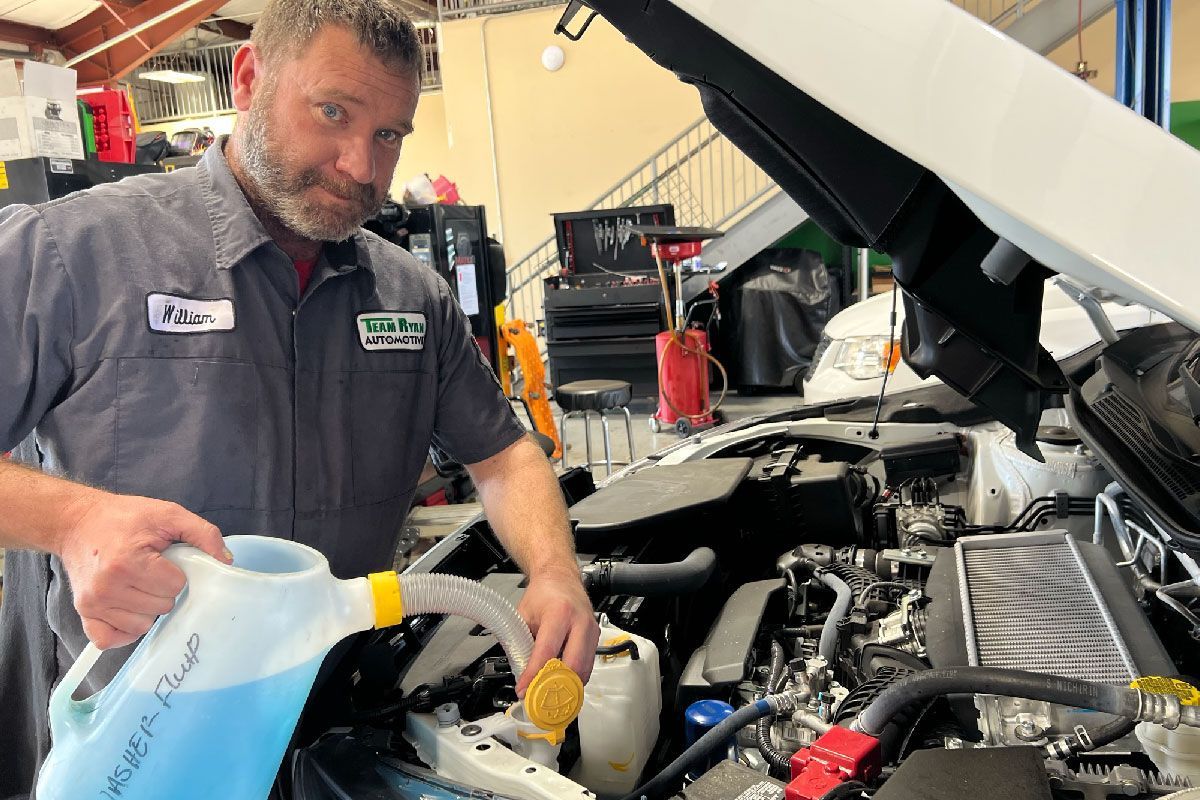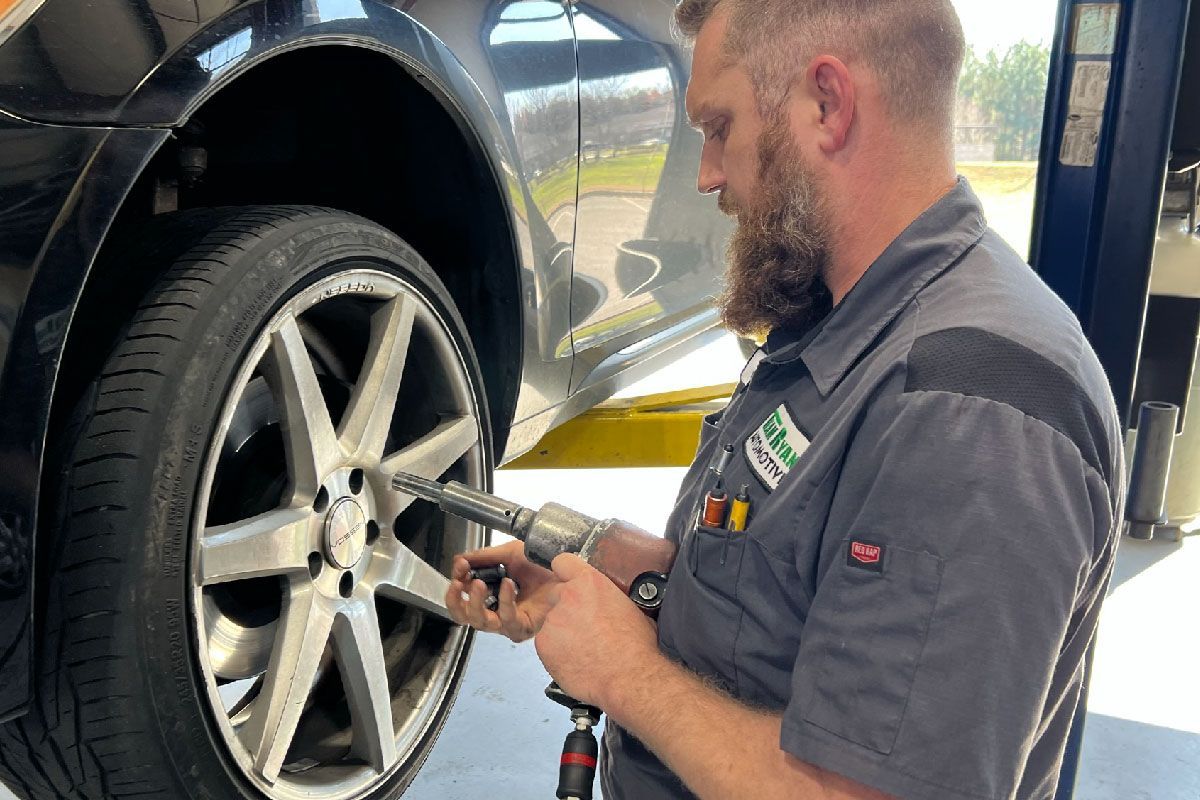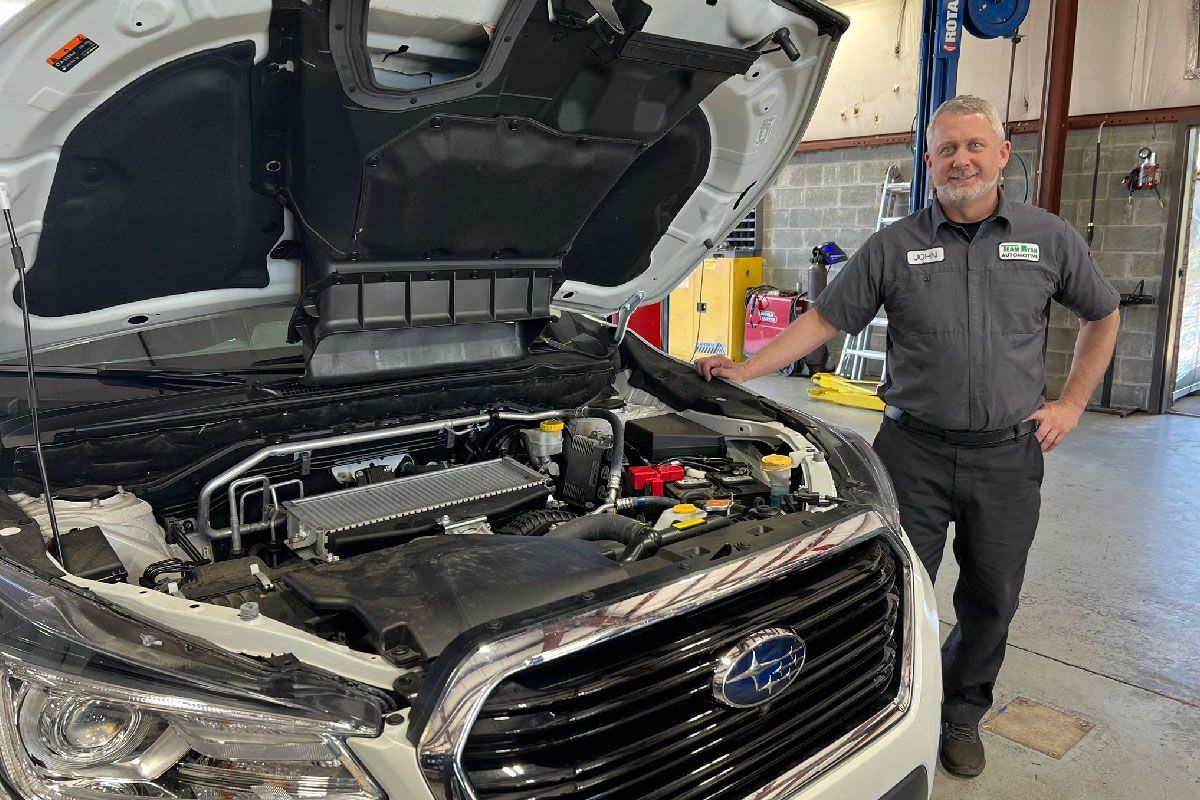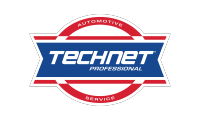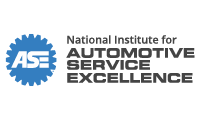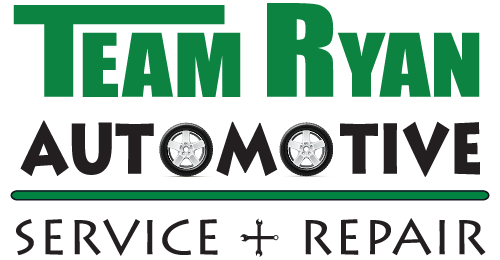Call Buford: 678.765.7926
2959 S. Waterworks Road, Buford, GA 30518
Call Cumming: 678.341.9602
2585 Freedom Pkwy, Cumming GA 30041
Automotive Brake Repair in Buford and Cumming, GA
Brake Repair
Want the best brake repair service for your car or truck? Your brake system is extremely important to stopping safely. A car that won’t start is an inconvenience, but a car that can’t stop is downright dangerous! While brake systems vary widely by year make and model, the typical system found on most family cars consists of disc brakes in front and either disk or drum brakes in back.
The brake system is one of your vehicle’s most important safety features. As we all know, this is the system that allows you to stop your vehicle’s momentum. You can also ease turns and stop at traffic lights, all doing so safely. That means, when there is something wrong with this system, it could lead to a rather dangerous situation. Team Ryan Automotive is here for all your brake system repair and service needs.
Jump To: More Details
-
Our Services
Button
-
Button
We are here to be your trusted mechanical team whether you need an oil service, inspection, brake service, engine or transmission replacement and so much more.
-
Make An Appointment
Button
-
Button
We understand that car problems are stressful, but we're here to help you through it. We help our customers come up with a game plan to ensure their vehicle is always safe & reliable.
What Our Customers Are Saying
-
Button
"Team Ryan did a great job on some basic maintenance tasks at a fraction of the price the dealer quoted me. They offered education & advice about additional services, but no hard sell. Service Advisor was friendly and knowledgeable. I'll be back."
- Charlie B.
-
Button
"Team Ryan Automotive is the best! They did the 100,000 mile service on my truck. It didn't take long, was affordable, and I trust the team there to do it right. This is my new maintenance shop!"
-Scott M.
-
Button
"Very happy with Team Ryan! The transmission just started slipping and I didn't feel safe driving. We needed to have the company truck back on the road asap. The work was initiated immediately and completed in one day and done with care and professionalism! Thank you for your help and allowing us to be back in business without skipping a beat. Excellent service...Go TEAM!!"
- Viet N.
How An Automotive Brake System Works
Your vehicle’s brake system is vital to the safety of your car, so let’s go over the different parts of an hydraulic brake system:
- Brake Pedal: This is what your foot pushes in order to activate your brakes.
- Brake Master Cylinder: This is activated by the brake pedal.
- Brake Lines: These carry brake fluid from the master cylinder to the wheels where pressure is applied to stop the car.
- Rotors/Drums: Your vehicle either has rotors or drums, and they are what the brake pads rub against to create friction.
- Wheel Cylinders: These are connected to the brake pads, and they either squeeze or push apart the pads when fluid flows through them.
- Brake Pads: These rub against the rotors or drums to cause friction.
What Causes A Brake System Problem
The most common cause of a brake system problem is brake fluid loss. If your vehicle has a brake fluid leak, it would be visible below your vehicle. If you notice a leak, for safety reasons, we recommend not driving that vehicle until the leak is repaired and the fluid is replaced.
How To Know If Your Brake System Needs Maintenance
Here are some signs that will tell you when your brakes need to be serviced or repaired:
- Grinding when you come to a stop
- Vehicle pulls to one side when braking
- Car wobbles or vibrates when driving on the highway
- Pulsating brake pedal or steering wheel shake while braking down hills
- Brake pedal feels mushy or softer than usual
- Any noise like a squeal, scrape, grind, or clicking sound when you step on the brake pedal
- Repeatedly adding brake fluid to the master cylinder
- Any brake fluid leaking from your car
- Unusual odor or noise
- ABS and/or brake light is illuminated while driving or braking
Your brake system is the most important safety item your vehicle can offer. So please stop in or call us right away if you experience any of the symptoms listed above. We’ll schedule you right away to have one of our expert, ASE certified, brake repair mechanics fully inspect your entire brake system and use NAPA parts. Remember, your family’s safety is our biggest concern, take one of our free loaner cars to drive while we inspect and service your brakes. Stay local – Trust the professionals at Team Ryan Automotive for all your brake repair and maintenance in Buford and Cumming, GA.
Our Brake Service & Repair Includes
We offer comprehensive brake repairs and services. While your vehicle is with us, we will check the following:
- Brake pads
- Calibers
- Brake/hydraulic fluid
- Brake hoses
- Rotors
- Brake hardware
Let our ASE certified technicians assist you with your brake service needs. Did you know that we include a free brake inspection with every oil change?
Understanding More About Brakes
One thing you can do as a vehicle owner is better understand the different moving parts that make up your brake system. When you press your brake pedal the brake pads create friction; in turn, the brake rotor disperses heat throughout the vehicle to keep the brakes themselves from overheating. Both are essential to the proper functioning of your braking system.
There are 3 categories of components to consider when we inspect your brake system for normal wear or problems; hydraulics, friction material, and computer controlled electronics for your Anti Lock Brakes (ABS).
Brake Hydraulics Systems
The Master Cylinder acts as the reservoir for the excess brake fluid and creates the hydraulic force needed to stop your car when you step on the brake pedal. Connected by a series of high pressure steel brake lines and rubber brake hoses, your master cylinder is the device that does most of the hard work. Supplying the force behind the hydraulic brake fluid when you step on the brake pedal to come to a stop. Think of your cars master cylinder like a pressure converter. When you press down on the brake pedal (physical pressure from your foot), the master cylinder converts this to hydraulic pressure, and brake fluid is responsible for transferring this force to each of your wheel’s brakes.
The master cylinder, the heart of the vehicle’s braking system, holds the brake fluid when it is not being delivered to the brakes through the brake lines. If brake fluid leaks because the master cylinder is worn or brake lines are plugged or broken, the fluid cannot be delivered, and the brake pads will become ruined.
Brake Lines are typically made from steel, run from the master cylinder along the frame, and carry the high hydraulic brake fluid pressure to each wheel. If the brake lines are allowed to rust too much, they can rupture unexpectedly during a panic stop. This emergency situation can result in your brake pedal falling to the floor and not being able to stop in time.
The brake fluid itself can become dirty or contaminated as it draws rust-causing moisture and picks up other debris, or it can break down from excess heat. Clean brake fluid is either clear or slightly yellow, while dirty brake fluid may be brown or even black. Old and dirty brake fluid can damage ABS brake systems internally.
Rubber brake hoses connect the steel brake lines to each wheel, providing the flexibility needed when your car is going over bumps or rough terrain. They directly deliver pressurized brake fluid to the brake calipers or wheel cylinders.
Disc brake calipers squeeze your brake pads onto the brake rotor to help you stop your car. Brake calipers come in many sizes, but they all have pistons and seals that convert hydraulic brake pressure into a squeezing motion that requires a friction material called brake pads. All modern automotive brake systems use brake calipers on the front wheels and most cars also use them on the rear as well.
Brake pads and shoes can be made of ceramic, metal or organic materials, while the disc rotors and drums they press against are made of metal. Because the pads and shoes create friction to stop the car, they gradually wear down over time and may wear away completely, letting the metal of the calipers and cylinders they are attached to grind against the rotors and drums and damage them. Some pads have a metal strip attached that sounds a warning whistle when the pad becomes too worn, but this strip sounds only when the car is in motion and the brakes are not applied.
Brake Rotors and every disc brake system uses disc brake rotors made out of steel to provide the needed drag when the brake pads are being squeezed by the calipers. Since they undergo intense heat and pressure, they can warp which causes the all too familiar pulsation feel when stepping on the brakes. Brake rotors are a wear item and need to be cut or machined and often replaced with every brake job as they slowly wear down below their minimum allowed thickness.
Wheel Cylinders: Instead of squeezing brake pads like a caliper does on disc brake system, some cars use wheel Cylinders on the back wheels in a drum brake system that convert this hydraulic pressure into a pushing motion. The wheel cylinders have two rubber-sealed pistons that convert the hydraulic pressure to push out on brake shoes so they can rub on the inside of the brake drum. This friction causes the vehicle to slow down when you step on the brake pedal.
A drum brake system isn’t as efficient as a disc brake set up, but since the rear brakes usually only supply about 20-30% of your cars braking it works just fine.
Cars with a drum brake system use a drum made of steel to provide the drag needed when the brake shoes are pushed out into them. Since they undergo intense heat and pressure, they can warp which causes the all too familiar pulsation feel when stepping on the brakes. Drums also wear out over time like rotors and need to be replaced or machined as necessary each time a rear brake repair job is performed.
Parking Brake System: Each time you park your vehicle, the emergency brake or parking brake system should be applied to hold your vehicle firmly in place. This helps to relieve the strain of your vehicle's weight being placed on the park mechanism inside your transmission and could also prevent that park pin from getting sheared off in the event of a bump in a parking lot. Another advantage of always using your parking brake is to keep it exercised so that you’ll know whether or not it will work when you need it in an emergency.
Team Ryan Automotive proudly serves the Brake Repair and Service needs of customers in Buford, GA, Cumming, GA, Sugar Hill, GA, Suwanee, GA, and surrounding areas. If you are in need of auto brake repair and service in Buford, and Cumming GA, stop by Team Ryan Automotive and talk with one of our friendly and knowledgeable brake mechanics about your car’s brake replacement & repair service. Or feel free to give us a call and we’ll be happy to help you with any concerns.
Schedule Now
All Auto Repair Services
BUFORD, GA
2959 S. Waterworks Road, Buford, GA 30518
678.765.7926
Business Hours
- Mon - Fri
- -
- Sat - Sun
- Closed
CUMMING, GA
2585 Freedom Pkwy, Cumming GA 30041
678.341.9602
Business Hours
- Mon - Fri
- -
- Sat - Sun
- Closed

